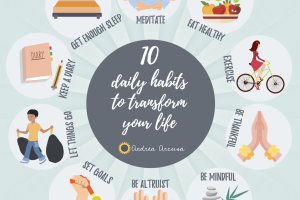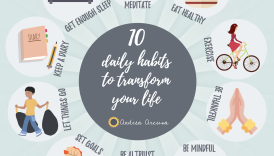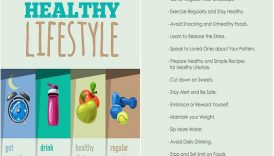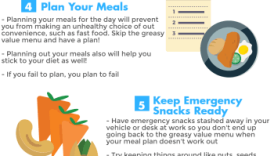Transform Your Life with These Healthy Habits

Setting the Stage for Wellness
In today’s fast-paced world, maintaining a healthy lifestyle can feel overwhelming. However, prioritizing wellness isn’t just a trend—it’s a necessity. From busy professionals to students juggling multiple responsibilities, everyone can benefit from making small changes that lead to a healthier life. Imagine waking up each morning with energy and clarity, ready to tackle the day. This isn’t just a dream; it can become a reality with a few strategic lifestyle choices. Here are some key areas we’ll explore:
- Transform Your Life with These Healthy Habits
- Setting the Stage for Wellness
- Section I: Importance of Healthy Eating
- Balanced Diet
- Meal Planning
- Section II: Regular Physical Activity
- Exercise Routine
- Fitness Tracking
- Section III: Quality Sleep
- Sleep Hygiene
- Relaxation Techniques
- Section IV: Stress Management
- Mindfulness
- Time Management
- Section V: Hydration
- Water Intake
- Tea and Coffee Consumption
- Section VI: Mental Wellness
- Meditation
- Journaling
- Section VII: Social Connections
- Community Engagement
- Building Relationships
- Section VIII: Healthy Habits Maintenance
- Accountability
- Habits Tracking
- Conclusion
- Embracing a Healthier Lifestyle
- Healthy Eating: Discover the power of a balanced diet and the role of meal planning.
- Physical Activity: Understand how a regular exercise routine and fitness tracking can transform your day.
- Quality Sleep: Embrace sleep hygiene and relaxation techniques for better rest.
By breaking it down into manageable sections, readers will find practical advice to enhance their overall well-being, making the journey toward a healthier lifestyle not only achievable but enjoyable. Let’s dive deeper into these essential components!
Section I: Importance of Healthy Eating
Balanced Diet
Healthy eating begins with a balanced diet, which is essential for maintaining overall well-being. A balanced diet provides the body with vital nutrients, vitamins, and minerals it needs to function optimally. It typically includes:
- Fruits and Vegetables: Aim for a variety of colors on your plate to ensure you’re getting a broad spectrum of nutrients.
- Whole Grains: Feel full longer and keep your energy levels steady with options like brown rice, quinoa, and whole-grain bread.
- Protein: Incorporate healthy sources such as lean meats, fish, beans, and nuts to support muscle health.
For instance, I once struggled with fatigue due to poor eating habits. Once I switched to a balanced diet rich in these food groups, my energy levels soared!
Meal Planning
Another key aspect of healthy eating is meal planning. Taking some time each week to plan meals can greatly enhance your nutrition. Here’s why:
- Saves Time: Prepping meals in advance reduces last-minute unhealthy choices.
- Reduces Waste: A thoughtful plan minimizes food spoilage and waste.
- Budget-Friendly: Buying in bulk can help you save money while ensuring you have nutritious options on hand.
Consider using a simple template to sketch out meals for the week, including breakfast, lunch, and dinner. Personalizing your meal plan will make the process enjoyable and sustainable, ultimately leading to healthier choices!
Section II: Regular Physical Activity
Exercise Routine
Just as a balanced diet is vital for good health, incorporating regular physical activity into your daily routine is equally essential. Establishing an exercise routine can be both rewarding and enjoyable. Whether it’s hitting the gym, practicing yoga, or simply taking brisk walks, staying active has numerous benefits, including:
- Enhanced Mood: Physical activity releases endorphins, which can elevate your mood and reduce stress.
- Better Sleep: Engaging in exercise regularly can improve sleep quality.
- Increased Energy Levels: Contrary to popular belief, working out boosts your energy rather than depleting it.
For personal experience, I used to dread exercise until I found a salsa dancing class. Now, not only do I look forward to every session, but I’ve also made wonderful friends along the way!
Fitness Tracking
To make the most of your physical activity, consider fitness tracking. Monitoring your progress can keep you motivated and accountable. Here are some effective methods to track your fitness:
- Mobile Apps: Use apps like MyFitnessPal or Fitbit to log workouts and set goals.
- Wearable Devices: Fitness trackers can help monitor your heart rate, steps, and calories burned.
- Journals: A simple notebook can be used to jot down workouts and reflect on progress.
Each week, I review my fitness data and celebrate small victories, like completing an extra set or running a few minutes longer. This practice keeps me motivated and reminds me that every step counts toward a healthier lifestyle!
Section III: Quality Sleep
Sleep Hygiene
Now that we’ve discussed the importance of regular physical activity, let’s shift our focus to a crucial component of overall health: quality sleep. Sleep hygiene refers to the habits and practices that promote restful sleep. By establishing a consistent sleep routine, you can greatly improve your sleep quality. Here are some effective strategies:
- Set a Schedule: Go to bed and wake up at the same time every day, even on weekends.
- Create a Relaxing Environment: Keep your bedroom dark, quiet, and cool to promote better sleep.
- Limit Screen Time: Avoid screens at least an hour before bedtime; the blue light can interfere with your sleep hormones.
I found that placing my phone in another room and reading a book before bed significantly improved my sleep quality!
Relaxation Techniques
Integrating relaxation techniques into your nightly routine can further enhance your sleep. Engaging in calming practices helps prepare your mind and body for rest. Consider incorporating these techniques:
- Deep Breathing Exercises: Focus on deep, slow breaths to calm your body.
- Meditation: Spend a few minutes meditating to clear your mind.
- Gentle Stretching: Light yoga or stretching can relieve muscle tension and promote relaxation.
I often dedicate the last 15 minutes of my day to guided meditation, and it truly transforms my sleep. By prioritizing quality sleep, you set the foundation for a more energized and productive day ahead!
Section IV: Stress Management
Mindfulness
As we transition from the importance of quality sleep, it’s essential to address stress management—an often overlooked aspect of maintaining overall wellness. One powerful technique for managing stress is mindfulness. By practicing mindfulness, you can cultivate a state of awareness and presence, which helps to reduce anxiety. Here are some effective ways to incorporate mindfulness into your daily routine:
- Mindful Breathing: Spend just five minutes focusing on your breath, inhaling deeply and exhaling slowly.
- Gratitude Journaling: Write down three things you’re grateful for each day to shift your focus from stressors to positives.
I began practicing mindfulness during my morning coffee break, and it truly transformed my outlook and stress levels throughout the day.
Time Management
Another critical element in managing stress is effective time management. When responsibilities pile up, the feeling of being overwhelmed can escalate. Implementing these time management strategies can ease that burden:
- Prioritize Tasks: Use the Eisenhower Matrix to categorize tasks by urgency and importance.
- Set Boundaries: Learn to say ‘no’ to commitments that may stretch you too thin.
- Break Tasks Down: Divide larger projects into smaller, manageable steps to make them less intimidating.
Since I started using a planner to organize my tasks, I’ve seen a significant reduction in my stress levels. By mastering these techniques, you’ll create a more balanced and enjoyable life, free from unnecessary stress!
Section V: Hydration
Water Intake
After addressing stress management, another vital component of a healthy lifestyle is proper hydration. Consuming enough water daily can greatly impact both physical and mental well-being. Here are some tips to ensure adequate water intake:
- Carry a Water Bottle: Keep a reusable bottle on hand to remind yourself to hydrate throughout the day.
- Set Goals: Aim for about 8-10 cups of water daily—though individual needs may vary based on activity levels and climate.
- Infuse Your Water: Flavor your water with fruits like lemon or berries to make it more appealing.
For me, switching to a hydration app helped me track my water intake, and I’ve felt more energized as a result!
Tea and Coffee Consumption
While water is essential, tea and coffee can also contribute to your hydration needs when consumed mindfully. Here’s how to enjoy these beverages:
- Moderation Is Key: Limit caffeine intake to moderate levels—generally up to 400 mg for most adults.
- Opt for Herbal Teas: Herbal teas can be caffeine-free alternatives that offer delicious flavor and additional health benefits.
- Balance with Water: For every cup of coffee or tea, have a glass of water to stay hydrated.
I’ve found that starting my day with green tea instead of coffee keeps me alert without the jitters while complementing my hydration efforts. By making hydration a priority, you’ll pave the way for improved energy and clarity, allowing you to thrive!
Section VI: Mental Wellness
Meditation
Continuing from our discussion on hydration, let’s explore another crucial aspect of a healthy lifestyle: mental wellness. One effective way to enhance mental well-being is through meditation. This practice encourages mindfulness and can help alleviate stress and anxiety. Here are some ways to get started with meditation:
- Find a Quiet Space: Choose a peaceful spot where you won’t be disturbed.
- Start Small: Begin with just five minutes a day and gradually increase the duration.
- Focus on Your Breath: Pay attention to your inhalations and exhalations, gently bringing your mind back whenever it wanders.
I’ve incorporated short meditation sessions into my mornings, and I notice a significant boost in my overall mood and focus throughout the day.
Journaling
Another fantastic tool for mental wellness is journaling. Writing down your thoughts and feelings can offer clarity and help process emotions. Here are some tips for effective journaling:
- Set a Regular Time: Make journaling a daily or weekly habit to establish consistency.
- Use Prompts: If you’re unsure where to start, prompts like “What am I grateful for today?” can spark inspiration.
- Be Honest: Allow yourself to write freely; there’s no right or wrong way to express your thoughts.
In my experience, journaling has served as an emotional outlet that helps me reflect and grow. By prioritizing mental wellness through meditation and journaling, you can foster a calmer, more balanced mindset that enhances every facet of your life!
Section VII: Social Connections
Community Engagement
As we continue from our exploration of mental wellness, let’s highlight the significance of social connections. Engaging with your community plays a vital role in fostering a sense of belonging and enhancing well-being. Here are some ways to get involved:
- Volunteer: Donating your time to local charities or organizations can create meaningful connections while giving back.
- Join Clubs or Groups: Participate in local interest groups or clubs that align with your passions, such as book clubs or sports teams.
- Attend Community Events: Festivals, workshops, and local meetings provide opportunities to meet new people and learn new things.
For example, I started volunteering at a local animal shelter. Not only did I meet fantastic people, but I also developed a deeper connection to my community.
Building Relationships
In addition to community engagement, nurturing personal relationships is equally important. Strong relationships can provide emotional support and enhance overall happiness. To strengthen your connections, consider these strategies:
- Make Time for Friends: Schedule regular catch-ups, be it coffee dates or weekend outings.
- Be Open and Honest: Foster a safe space by sharing your thoughts and feelings with loved ones.
- Show Appreciation: Express gratitude and appreciation for the people who bring joy to your life.
I’ve noticed that simply reaching out to friends to share a meal can make a significant difference in our bonds. By prioritizing social connections through community engagement and personal relationships, you create a support system that enriches your life and promotes overall health!
Section VIII: Healthy Habits Maintenance
Accountability
As we wrap up our journey through essential aspects of a healthy lifestyle, let’s discuss maintaining healthy habits. One of the keys to sustaining these positive changes is accountability. Having someone to share your goals with can greatly enhance your commitment. Here are a few effective ways to foster accountability:
- Find a Buddy: Partner with a friend or family member who shares similar goals and check in regularly.
- Join a Support Group: Participate in groups, either in-person or online, where you can share progress and challenges.
- Set Clear Goals: Establish specific, measurable goals—this makes it easier to stay focused and share your milestones.
In my experience, having a workout partner has motivated me to push through tough days and stay consistent!
Habits Tracking
In addition to accountability, tracking your habits is instrumental in maintaining healthy routines. Regularly monitoring progress can boost motivation and help identify areas for improvement. Consider these methods for effective habits tracking:
- Use Apps: There are numerous habit-tracking apps available that allow you to log daily activities and visualize progress.
- Create a Journal: A simple notebook can serve as a space to record achievements, challenges, and reflections.
- Start a Calendar: Keep a calendar to mark your progress; seeing your journey visually can be incredibly satisfying.
I’ve personally found that keeping a habits tracker not only motivates me but also highlights the positive changes I’ve made over time. By fostering accountability and tracking habits, you can ensure that your healthy lifestyle becomes a lasting part of your routine!
Conclusion
Embracing a Healthier Lifestyle
As we conclude our exploration of the various dimensions of health, it’s clear that adopting a holistic approach can significantly enhance overall well-being. From nurturing physical health through balanced diets and regular activity, to cultivating mental wellness with meditation and journaling, each aspect contributes to a healthier, happier life. Reflecting on my journey, I’ve realized that the small, consistent changes have made the most impact. Here are a few key takeaways to remember:
- Integrate Healthy Eating: Keep nourishing your body with balanced meals.
- Prioritize Sleep: Make quality sleep a non-negotiable part of your routine.
- Build Connections: Foster relationships and engage with your community.
By focusing on accountability and habit tracking, you can maintain these positive changes. Remember, health is a continuous journey—celebrate your progress, no matter how small, and keep striving for a balanced and fulfilling life!





